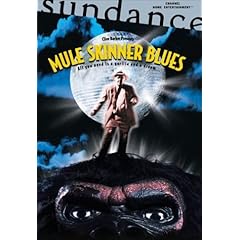
I've been trying to figure how best to sing the praises of the 2001 documentary "Mule Skinner Blues," but it's a movie that pretty well defies categorization. So how 'bout this: just see it already.
Not enough?
Okay, here's the basic plot synopsis: While shooting a music video near Jacksonville, a young director stumbles upon Beanie Andrew, who happens to own an old car the director thinks would be good for the shoot. Beanie is sort of like the unnoficial mayor of his trailer park, a trailer park filled with an assortment of characters one could only find in a North Florida trailer park. Beanie has always fancied himself an entertainer -- he does a little singing, a little dancing, he plays the kazoo (at one point he scoffs at the idea of the kazoo as a child's toy; "No child," he says. "Knows how to handle this complicated instrument.")
So, inspired by his small role in this small video, Beanie gets a camera and starts shooting footage of his neighbors that he sends, unsolicited, to the director, now back in NYC. At a certain point the director realizes Beanie might really have something -- a certain eye for detail, a way of drawing his neighbors out, making them sing or dance or confess their sins. But when he gets in touch, Beanie's got another surprise: he and a friend have written a horror script, and want to shoot it -- it's called "Turnabout is Fairplay," and centers on a dead musician who rises up out of the swamp as a gorilla.
As Beanie explains: "I've just always had this image in my head, this image of me coming up out of that mud in a gorilla mask."
Beanie's neighbors -- who star in both the documentary and Beanie's film -- include a down-on-his-luck alcoholic musician, a design school grad with a garage full of homemade costumes and her dead dog in a freezer (she's moving soon, and doesn't want to bury him until she gets to her new house), and a sci-fi writer who runs a cleaning business with his mail-order wife.
Yes, it's as weird as it sounds. But it's also not weird at all. The movie could so easily descend into cynicism -- look at the funny rednecks, ha ha -- but it refuses to make fun of its major players. Instead, it's tender and loving to all of them, as tender and loving as Beanie is to everyone he turns the camera on.
At one point, Beanie "interviews" some black shrimpers who -- like him -- have lost their livelihoods because of laws that limit the use of shrimp nets. He says "Now some people think certain folks ain't good people 'cause they poor, or 'cause the color of they skin, but we all know that ain't true, don't we?" Beanie is, in the end, the kind of guy who can't even comprehend racism, it so goes against his own spirit of generosity.
Maybe it's just homerism that makes me like this movie so much: it's like a big, happy rebuttal to every cheap "trailer trash" joke, to every movie with the stereotypical "southern" characters. For once the accents are real, the stories they tell are just as wonderful as the ones I grew up hearing, they're not dumb or bigoted or blindly religious. They're just awesome, and real.
3.05.2008
"If you fall in the mud, you just might come back as a gorilla"
Subscribe to:
Post Comments (Atom)



2 comments:
I definitely need to see that! For the Wisconsin portion of this documentary theme, see American Movie.
It's funny, because I was turned onto it by Roy Blount, Jr., who in an essay said it was like the Southern version of American Movie, but even better/weirder.
And I think it's more generous with the characters.
Post a Comment